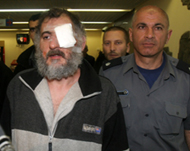Nazareth incident heightens tensions
A Roman Catholic bishop has called for better protection of Christians and their holy sites after an Israeli couple and their daughter set off a series of small explosions in the Basilica of the Annunciation in Nazareth.

Although Friday’s attack on a major shrine in the town of Jesus’ boyhood apparently was driven by personal distress and not extremism, it heightened religious and political tensions in the Holy Land.
“We don’t understand why and how this man came here, given his personality. Who sent him here?” Latin Patriarch Michel Sabbah, the top Roman Catholic official in the Holy Land, said on Saturday.
“It is unclear, but it gives fuel to our anxieties about the future.”
The incident began on Friday evening when the three suspects, using a baby stroller, smuggled firecrackers and small gas canisters into the packed basilica during Lent prayers. The church was not guarded at the time.
The assailants threw the explosives and were beaten by worshippers before Israeli police arrived and locked them in a room for protection, police said.
After a three-hour standoff between police and thousands of protesters, the suspects were led away through a back exit, disguised as police officers.
Protest march
Christian leaders on Saturday organised a march through the streets of Nazareth to protest the attack, which caused light damage to the church but sparked stone-throwing riots in which two dozen people, including 13 Israeli police officers, were hurt.
Several hundred people joined Saturday’s protest, clapping and holding Palestinian flags. “They accuse of us terrorism, but they do terrorism,” read one banner.
 |
|
Habibi, the suspect, has been |
Police said the man involved in the attack, Haim Eliyahu Habibi, had financial problems, and apparently is not a Jewish extremist.
Habibi, his Christian wife Violet and their 20-year-old daughter were treated at a hospital before being taken into custody early Saturday.
Habibi’s daughter told investigators her parents had wanted to create a provocation to draw attention to their economic troubles and protest that two of their children had been taken from them by the Israeli authorities, Yaakov Sigdon, a police commander in northern Israel, told Israel Radio.
Several years ago, the family had sought political asylum in a West Bank town under Palestinian control for similar reasons.
But many Arabs dismissed the Israeli explanation, saying the government could have done more to prevent the attack and protect the Christian minority.
Vatican call
Tzipi Livni, the Israeli foreign minister, contacted the Vatican late on Friday, offering assurances that Israel is committed to protecting Christian holy places, officials said.
Ehud Olmert, the acting prime minister, also discussed the situation with Nazareth’s mayor, Olmert’s office said.
|
“It’s a big tragedy for all of us in Israel, for Christians, for having their most holy places spoiled and used in a barbaric way” Archbishop Elias Shakur, |
Archbishop Elias Shakur, the top Roman Catholic official in Nazareth, issued a call for unity among Israel’s citizens and dismissed the attackers as lone extremists. While praising the Israeli response, he said “it is not enough”.
“It’s a big tragedy for all of us in Israel, for Christians, for having their most holy places spoiled and used in a barbaric way,” he said.
Nazareth was quiet Saturday, and at the basilica a small group of worshippers gathered to pray. Black stains on the walls caused by the explosion were removed.
But tensions remained high in northern Israel, where much of the country’s Arab population is located. Police postponed at least seven matches Saturday, fearing riots could break out.
‘Hate culture’
In the Gaza Strip, Ismail Haniya, the designated Palestinian prime minister from the Muslim resistance Hamas group, held Israel responsible.
He said the attack was the result “of a hate culture which Israel is feeding its public against the Palestinians, and their Christian and Islamic holy places and believers”.
 |
|
Israeli Arabs make up 20% of |
Boulos Rececinto Marcuzzio, vicar of the Latin patriarch in Israel and a bishop in Nazareth, said Friday’s attack and anti-Christian riots last year in the northern Israeli village of Maghar were cause for concern.
“What happened … is strong enough to let us think that we have to ask for our legal protection here,” he said on Saturday.
In Maghar, Druze villagers had burned down dozens of Christian-owned businesses after rumours spread that Christian youths disseminated naked pictures of Druze girls on the internet.
No evidence has been found to substantiate the rumours, but villagers said they provided a spark to a situation in the divided village that was already tense. The Druze religion is a secretive offshoot of Islam.
Boyhood town
The Basilica of the Annunciation is built on the site where Christians believe the Angel Gabriel appeared before the Virgin Mary and foretold the birth of Jesus.
Nazareth, the boyhood town of Jesus, is located in northern Israel. It is inhabited by about 74,000 Arab Israelis, about two-thirds Muslim and the remainder Christian.
Religious tensions have boiled over in the past, with the two sides in a dispute over attempts to build a mosque next to the church.
 |
|
Protests broke out after Friday’s |
The attack also underscored the tense relations between Israel’s Jewish majority and its Arab minority.
Israeli Arabs, who make up about 20% of the population, complain of discrimination.
Israel’s roughly one million Arabs hold Israeli citizenship, in contrast to Palestinian residents of the West Bank and Gaza Strip who live under the Palestinian Authority.
Despite tensions between Jews and Arabs, violence is rare. Last August, a Jewish army deserter killed four Israeli Arabs in a shooting rampage on a bus.
The attacker was killed by a mob.
In the worst ethnic violence in Israel, police killed 13 Arab-Israeli demonstrators who blocked a highway in October 2000, shortly after the outbreak of the Palestinian uprising.